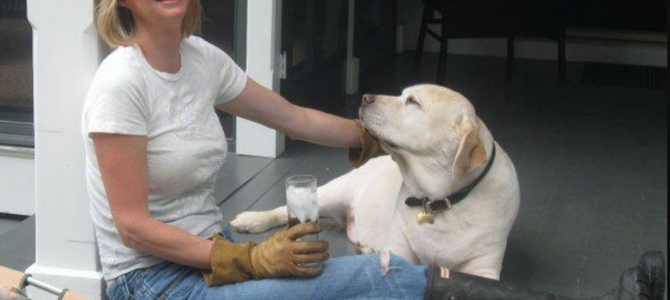
When I became an at-home mom, I didn’t know how to be one. My mother had worked. In Iraq she was a math and physics high school teacher. When we came to America she had to take whatever job she could get given her poor language skills.
With no family around to watch us, my sister and I became the proverbial American latchkey kids. When my mother was growing up, her mother, my grandmother, was a nurse. In Iraq there were no daycares. Grandparents, aunts, uncles, great aunts, or great uncles—a whole host of family members—created a pool from which a mother could extract child-care help.
I had no example for the option I had chosen. I felt out of place in toddler play groups, and inept at public library craft time. The only two things I excelled at was playing tea party and reading to the kids.
The balance between work and motherhood takes on a variety of forms. An author, journalist, and now the CEO of a new business venture, Danielle Crittenden Frum took time out from her busy schedule to answer my questions about opting-out and back in.
Balancing Women’s Many Roles in Life
LS: In your book, “What Our Mothers Didn’t Tell Us,” you wrote, “Our souls are large enough to accommodate many roles. And if we are lucky, these days most of us will live long enough to attempt everything we want.” Can you say a few words about what that has looked like in your life in all your different roles: as wife, mother, writer, and now a business owner?
DCF: I’ve been hugely lucky to have been in a profession, and a marriage, that has allowed me to work from home for most of my professional life. As a journalist and author, I always made sure I had a “room of of one’s own” in our house, even if that amounted to a desk in a common living space with a door that could be closed.
When the children were very young, no matter how tight money was, we always made sure there were a few hours each day that could be covered with some sort of childcare help so I could write. Having those dedicated hours, a truly closed door, allowed me to pursue my work in a way I couldn’t have if I’d been entirely at the mercy of a nap-and-feeding schedule. I was able to expand my hours when the children went to school.
Now, two of our children are grown and our third is nearly 15 years old (meaning the less time she has with me the better, from her point of view!). When I look back, I feel I enjoyed the best of both worlds. I never felt absent as a mother, but nor did I feel “imprisoned” as one.
Four years ago I took an executive job with the Huffington Post Canada that meant I had to travel to Toronto for a few days each month (and work from my Washington DC home the rest of the time). My youngest, then 11, was very understanding and supportive—but I could tell there were times she resented my travel, and certainly the greater demand the job put on my time. Until then, my work had been largely “invisible” to her. It started after she left for school, and vanished when she returned. Suddenly I was at my home desk as early as 6 or 7 a.m., and still at it until dinner, even while I broke to have breakfast with her or pick her up from school.
I felt a little guilty because it was not what she was used to. On the other hand, it was important to me to take this job—an amazing experience from every viewpoint, including the comical aspect of me returning to a newsroom nearly 30 years after last working in one. My daughter was old enough to appreciate the importance of this job to me, and of course, raised to be ambitious herself. Even while my absences bothered her at times, we were able to discuss it—and her father helped by picking up the slack, something he would not have been able to do in other stages of our lives. (There’s a whole other topic to be written on the third, later-life child.)
When I left the Huffington Post, I started my own business—which I joke is like having a newborn again. Now that my youngest is four years older, and very much involved in her own teenage life, she doesn’t seem to mind that her mother is half-crazy with work. Indeed, I’ve employed her at times, and over the summer. She’s the best worker I’ve ever had. She understands e-commerce better than I do. And quite often after school, she’ll take the bus down to my very cool, WeWork office space to do her homework and enjoy the free, excellent selection of herbal teas.
On Opting In and Opting Out
LS: What were some of the reasons you decided to opt back in?
DCF: I never decided to “opt out.” As noted, I’ve always straddled the divide. A writer never “retires,” so even if I had not started a business, I’d still be doing journalism and writing in some form. I’m also someone who always likes new challenges and gets restless if I’m not doing some sort of major project.
Starting and running a business is by far and away the hardest thing I’ve ever done—much scarier and harder than writing books or managing a department. Whether the business succeeds or fails depends on me. The bottom line depends on me. And the newborn analogy is apt: there is never a moment when I’m not thinking about it, or worrying about it, or feeling needed by it, or knowing I am entirely responsible for its well-being!
LS: What is your advice to mothers who are considering opting out?
DCF: I would say it depends on what you do, and the strength of your marriage/partnership. Many women don’t have a choice. If you are lucky enough to have the choice, you and your husband, or partner, have to be in agreement about the benefits to your family with you at home (and respectful of your desire to do so).
You will want to feel secure financially. There’s no question you take on financial risk down the road by opting out as opposed to those who work continuously. On the other hand, the risk is usually felt as worth it. Being at home with your children is a decision you never regret, period.
My mother stayed home with us before we were in school—she’d been a working newspaper journalist up until then—and it made things very tight for her and my father. They couldn’t afford furniture, we lived in a tiny apartment. When our first child was born, I thought whatever other things I might have wanted to do suddenly took strong second to this beautiful, tiny life I wanted to nurture and be with. And I didn’t want her looking back on her childhood in anger or resentment over a sense of parental neglect.
In the end, these decisions are profound, emotional and personal. If you make the decision, don’t look back.
How to Move from the Family Game to the Working Game
LS: What is your advice to mothers considering opting back in?
DCF: I have loved starting this new adventure, at the age of 52. I was 49 when I took the job at Huffington Post. Whatever drawbacks I suffer at this stage compared to my younger colleagues (computer help, anyone?) I make up for in experience, wisdom, and in the general stability of my life. I don’t get easily rattled, I’m way more confident in my abilities (including confident in what I don’t know and can’t do), and because I’m coming out the other end of child-rearing, I’m not trying to do the whole “balance” thing.
Motherhood has taught me skills I didn’t previously possess, and age gives me a more Zen-like approach to difficult situations (as did managing toddlers!). Employers who are lucky enough to employ women my age, who are re-joining the work force after time away, will find they are getting some of the best candidates out there.
Mothers should not be apologetic about being “rusty.” They are not rusty. They are the latest, most-optimized versions of themselves—and can easily make up any technical skills or learning they need to do in a short period, so long as they are open to doing so. Go for it.
LS: Tell us a little about your exciting new business.
DCF: A longstanding dream of mine has been to find curated, beautiful products for Jewish life. With my background as a lifestyle “content producer” (as they now call it), I created Fig Tree and Vine, which combines both: ecommerce Judaica and artisanal products with blogs about food, decor, travel, and design.









